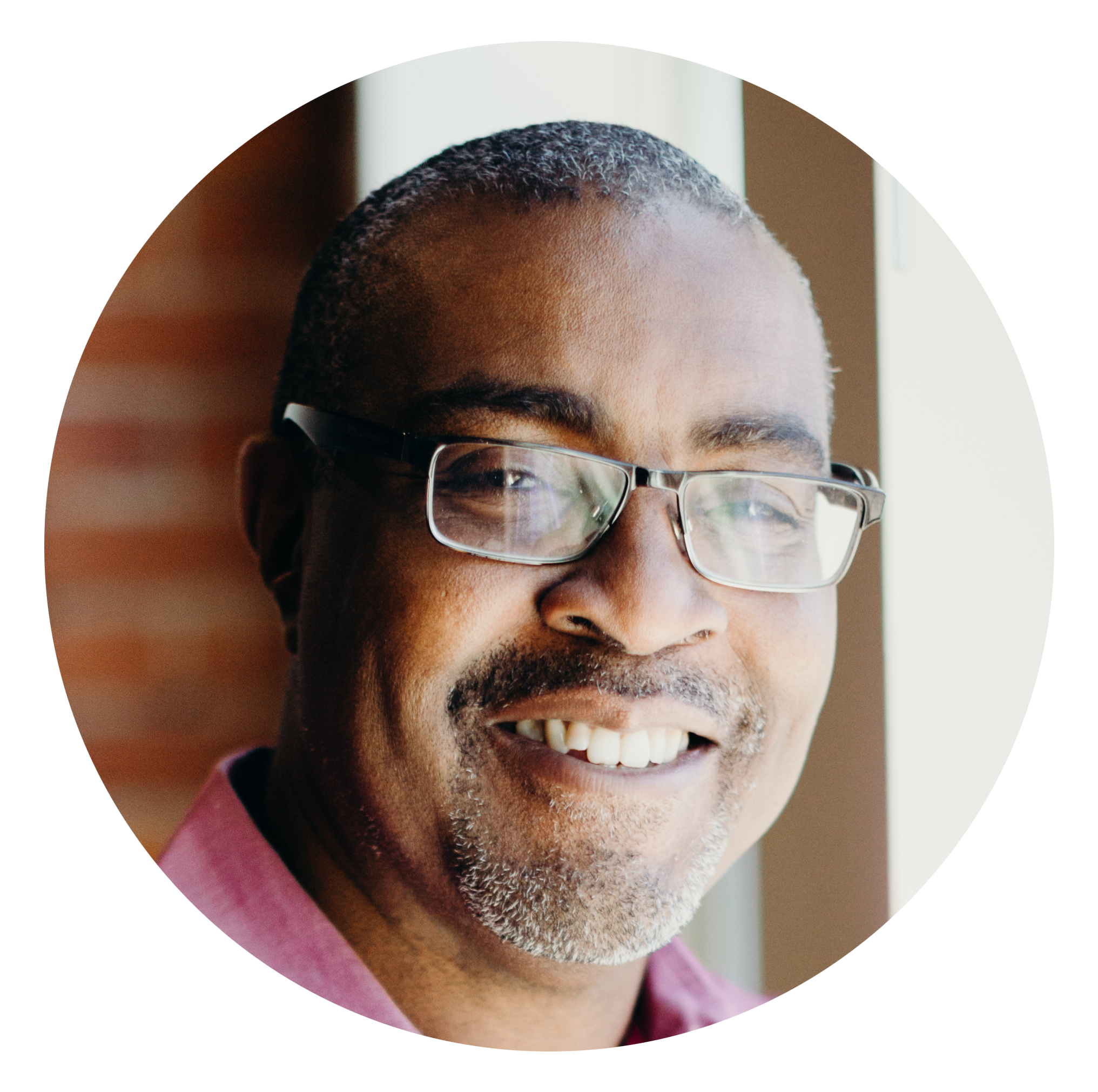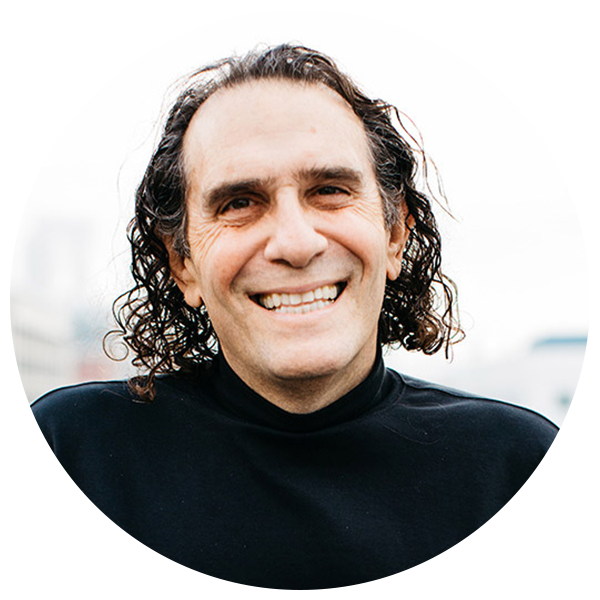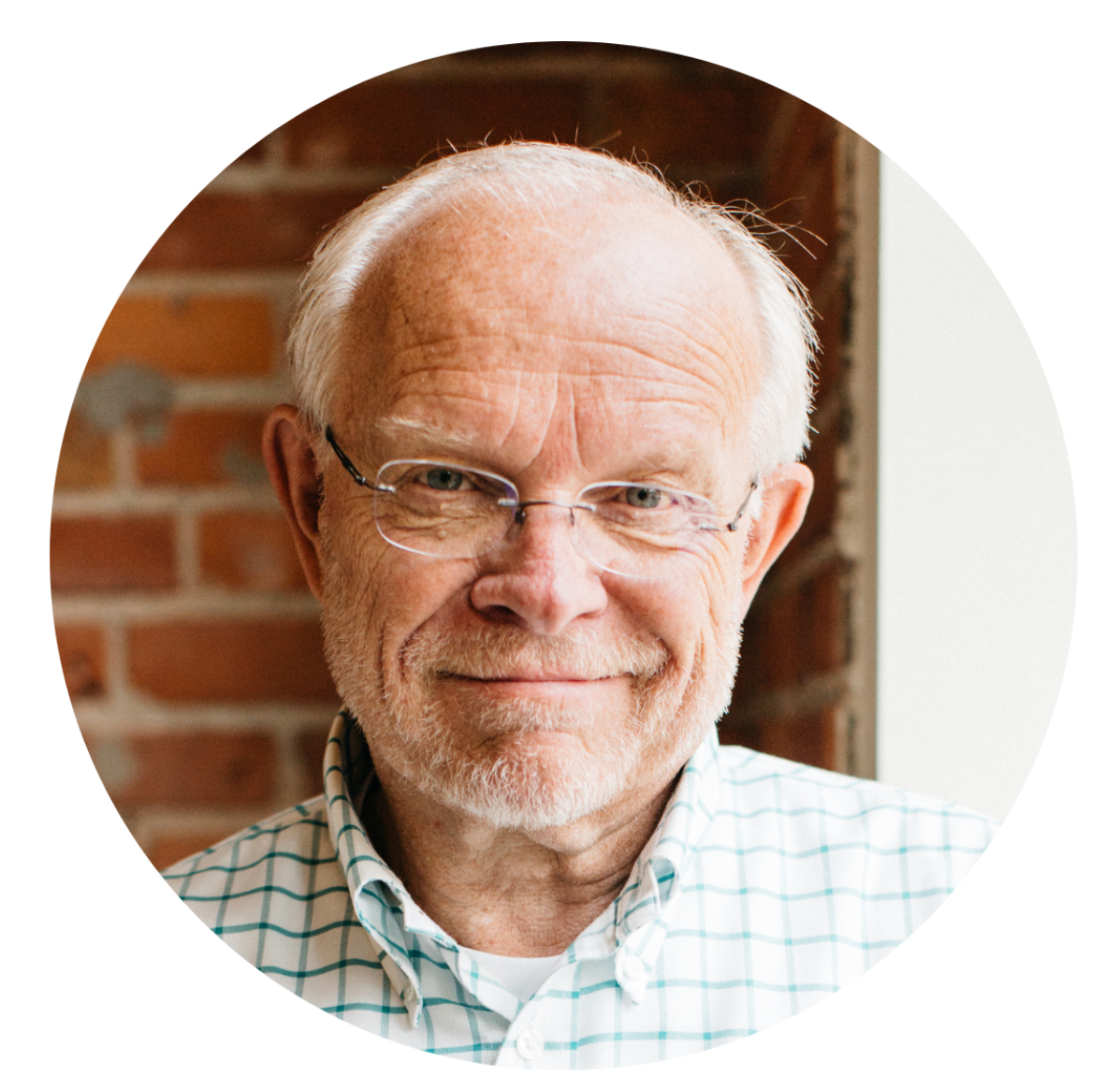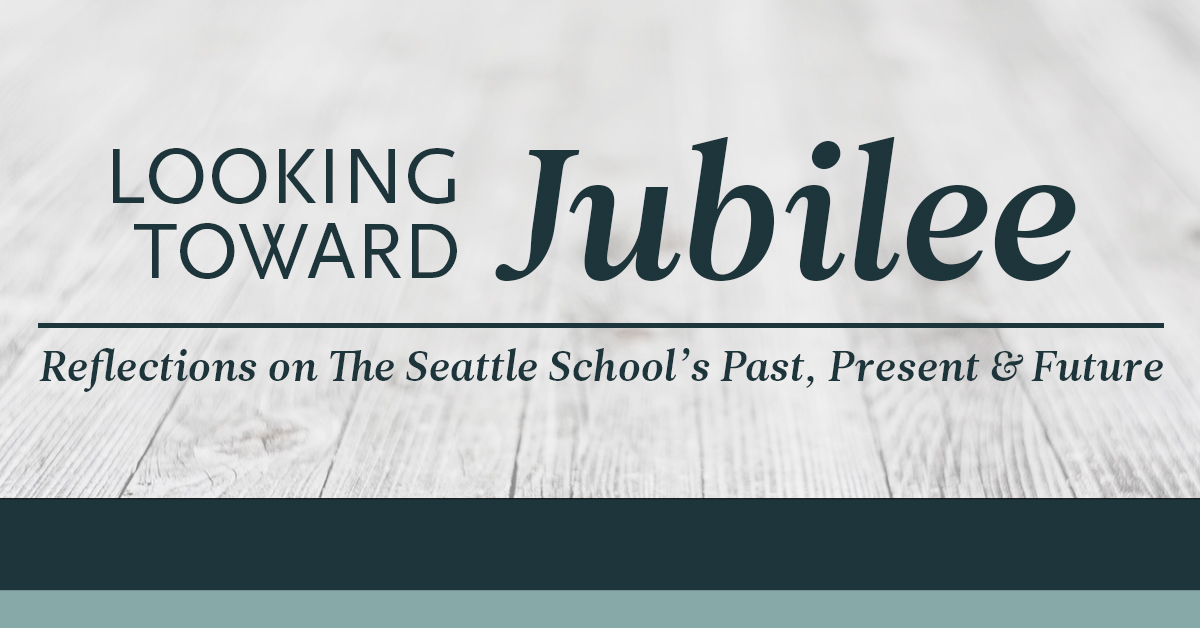In celebration of our 25th year as an institution, Dr. J. Derek McNeil, President and Provost of The Seattle School of Theology & Psychology, invited Dr. Dan Allender, founding President and Professor of Counseling Psychology, and Dr. Keith Anderson, President Emeritus, into a conversation on the past, present, and future of our calling and community. Listen as they describe the original hopes and dreams from our founding days and the continuing values of engaging in discourse, scripture, and stories. In the first episode, they described the original hopes and dreams from our founding days.
In this second episode, Derek, Dan, and Keith describe the tensions, trauma, and challenges of the current social environment. How can we live into discourse as people of Christ? How can we invite each other into difficult conversations, setting a table and sustaining a banquet through our disagreement? Next week’s podcast will include a glimpse into the future of The Seattle School with these three Presidents.
Our host for this miniseries:

Dr. J. Derek McNeil started at The Seattle School in 2010 as Senior Vice President of Academic Affairs before becoming the fourth President of The Seattle School in 2019. Since joining the institution’s leadership team, Dr. McNeil has been integral to our achievement of regional accreditation, the reimagining of our curriculum and degree programs, the securing of millions in grant funding, and the launching of Center for Transforming Engagement. Prior to his tenure at The Seattle School, he served as faculty in the PsyD program at Wheaton College Graduate School for over 15 years. Dr. McNeil has worked as a clinician in private practice, a diversity advisor, an organizational consultant, and an administrator. His research, writing, and speaking have focused on issues of ethnic and racial socialization, the role of forgiveness in peacemaking, the identity development of African-American males, leadership in living systems, and resilience.
Our guests for this miniseries:

Dr. Dan Allender co-founded The Seattle School of Theology & Psychology to create new training at the intersection of psychology, theology, and culture in order to equip people to serve more effectively in the dynamic contexts of the 21st century. From 2002-2009, Dr. Allender served as the first President of what was then known as Mars Hill Graduate School, navigating the young institution through crucial formative years and transitions. Guided by the support and leadership of The Seattle School, in 2011 Dan Allender, Becky Allender, and Cathy Loerzel founded the Allender Center to steward the legacy of his unique and innovative methodology for the healing of trauma and abuse. He hosts the podcast for the Allender Center and continues to teach in the classroom and at conferences. Dr. Allender is the author of multiple books, most recently Redeeming Heartache co-written with Cathy Loerzel. Before founding The Seattle School, he previously taught at Grace Theological Seminary and Colorado Christian University.

Dr. Keith Anderson first joined The Seattle School as Academic Dean in July 2006. In May 2009, he became the school’s second President, succeeding Dr. Dan Allender, a role he held until his retirement in October 2017. During Dr. Anderson’s tenure, The Seattle School received full accreditation from the Association of Theological Schools, added new faculty and staff, and launched the Allender Center. Prior to The Seattle School, Dr. Anderson had held roles in ministry and in academic administration at Northwestern College, Bethel University, and the University of Sioux Falls. He is the author of multiple publications including Reading Your Life’s Story: An Invitation to Spiritual Mentoring.
Resources:
- Our mission of training people to be competent in the study of text, soul, and culture to serve God and neighbor through transforming relationships is embodied in our graduate school, the Allender Center, and the Center for Transforming Engagement. Our commitment to provocative, challenging, nuanced Christian writing is held in the twice-yearly print and digital journal The Other Journal and also the regional journal Christ & Cascadia.
- Check our out 25-Year Anniversary page and our story and visual timeline to join us in this season of looking back and looking ahead.
Episode transcript:
Podcast Introduction: Welcome to the Seattle School Podcast, where we hold conversations at the intersection of text, soul, and culture. The Seattle School of Theology and Psychology is a graduate school and seminary in Seattle, Washington, on a mission to train artists, pastors, therapists, and change-makers to join God in the restoration of their communities through transforming relationships. In celebration of our 25th year as an institution, Dr. J. Derek McNeil, President and Provost of the Seattle School, invited Dr. Dan Allender, Founding President and Professor of Counseling Psychology, and Dr. Keith Anderson, President Emeritus, into a conversation on the past, present, and future of our calling and community. Listen in as they describe the original hopes and dreams from our founding days and the continuing values of engaging in discourse, scripture, and stories. In this episode, Derek, Dan, and Keith talk about setting the table. Thank you for listening and we hope you enjoy this conversation between Derek, Dan, and Keith.
Derek: That brings us to a little bit to thinking about now: we are in a social environment that’s challenging, quite challenging, particularly around institutions though. What does it mean to be a desire, to be a movement, in a time when institutions are failing and what does that mean for us? And I’d love for the two of you to speak a little bit to that as we face institutional challenge and questions of where we are now. And I know not just simply questions internally, but we’ve had questions externally to where we are now. But I’d love to hear your thoughts and feels on those sorts of things.
Dan: Well, certainly this is a conversation, not a full-fledged answer, but at least from my standpoint, we live in a polarized world that has become more deeply divided and enraged and looking for scapegoats. And in some ways, that is the most phenomenal opportunity to engage how Jesus became the scapegoat and how, in one sense, the whole goal is an engagement with the human heart or what could be called psychology and theology, or better said, the reflections from a biblical worldview. How do we build the bridge between the realities that divide us? And there is no one, no person but Jesus that can engage that. But Jesus is, shall we say, not controllable, not easily pinned-downable. And in that, Jesus is not of the left and he’s not of the right. So I think part of where we are as an institution is, how do we build bridges to simultaneously offend the left and the right, but in doing so to expose the reality that all of us struggle with our own form of idolatry, our own desire for empire, for control, for management, of all the chaos that we live in, how do we tell the truth about ourselves in a way that tells the truth about our larger culture that actually opens the door to the power of the gospel and both Jesus’ death, resurrection, and ascension–and the fullness of the story of God. That’s what I think we are attempting to do, certainly stumbling at times, but attempting to do in the context of this day.
Derek: Certainly it feels that’s the challenge. And I think you put it well. It gets fuzzy when Jesus gets fuzzy. I’ll say that in that way. When Jesus gets hijacked to the left or to the right or refused, rejected from the left or from the right in whatever form, we lose a sense of, I would say even ethical, moral, but deeper than that, a spiritual direction. And that has been the challenge of the current in some ways. It is how do we hold Jesus? And the fear of this is– Jesus is a part of our past as opposed to Jesus is a part of our future. And sort of, what do we look forward to, and is being lost for a rejection of what was. And I think that’s interesting. Again, Keith, I’m thinking about this language of movement, this sort of how do you, in the midst of a movement, something that’s dynamic, hold onto something that feels to be whole. And what I mean, I don’t want to say true, cause I think that word’s being battered around, but whole and full and a full spiritual sense of things.
Keith: I came across a note the other day from a dear friend of mine from my years in Tacoma, and the pastor, pastor at their, this is a woman, long story about her, but this is a woman who had climbed to the summit of Mount Rainier, I think, 12 times.
Derek: Whoa.
Keith: She is a tremendous mountain climber. And when she knew that I was in training to attempt that for the first time, she said, Keith, I want to tell you how to climb a mountain. And it would’ve been a great book title. She said: Hike. Talk. Zigzag. And what she meant by the zigzag was particularly for your knees on a descent. But there’s something missional, I think in what we’re talking about now in the zigzagging, instead of–there’s no straight line and we’re so thoroughly polarized that it will take a mighty work of the spirit and a long road around to get to where we can be together. And some of it is that: being together. We kind of don’t know how to do that anymore. I was in a coffee shop this week, and, there was, turned out to be the pastor of a local church, but he had a book that I had read, and I stopped and said something about it, and he kind of looked up and said, “You read this book?” And yeah, we started talking about it. He’s in a church now here on Whidbey Island, and they’ve lost a hundred people in the last two years because the politics are wrong, because they can’t talk to each other anymore.
And when I think about the present of The Seattle School, to me it is, it is all about discourse. Can we set a table where not only the left and right, and I mean you can pick all of the opposites, all the binaries that you want, but can we set a table for people to actually be together, first of all, and can we disagree? One of my direct reports in his first day on the job asked me a question that became very important to our work together. Not a question that a new employee has ever asked me before. This question was: Keith, I want to know how are we going to fight? And the one who’s laughing the loudest there, the one who’s laughing the loudest there, was the one who asked the question. And I said, naively, we’re going to fight fair, Derek. And he said, no. And we talked further until I realized what an important question that is. Can we disagree? Can we fight and come out of that as brothers and sisters in Christ? And my answer is yes, painfully. It’s going to take a lot more than just a few slogans and something on a t-shirt or a sweatshirt that says we can do that.
Derek: I agree. And I appreciate where you have held onto that and discerned what I was asking. And I think part of my joining the school was a belief that we could create enough space to do so. And it’s never, never ideal. It’s never perfect. But I felt like even then, if we couldn’t tussle, then how would we sit with each other in honesty as opposed to void? And the option of not tussling is to avoid. And that will always be the struggle of the school as well. Do we engage each other honestly, and commit to being with each other through difficult times? Or will we flee, will we kind of trauma response, Dan, a bit of fight or flight? How do we actually live into co-regulation?
We just had a meal with staff and we were trying to get staff to come back into the building. And one of the things we asked them, questions about what do you want to see in the next 25 years? And was sitting with some folk and they said, we want to see the reconciliation of folk who’ve left, folk who’ve been with us. And, in my bones, I feel like this is who we’re called to be as people of Christ: reconcilers. That doesn’t mean warm and fuzzy, that means struggling and tussling and remaking, renaming each other. But I do believe that’s what’s called for. And so Keith, you’re right, that notion of discernment, we’ve actually begun spending time as staff, and at some point with students, really working through what’s it mean to be people of discourse, people of talking about difficult topics, people of struggling with tensions that don’t easily resolve, particularly an external environment. And that feels to be part of our, who we’re called to be in this sense. Dan, I’d love to hear you and your thoughts about where we are and how you see us living into discourse.
Dan: Well, I think you’ve named it well in a traumatic age and in traumatic responses, the fight, flight, freeze, fawn, we’ve talked about that in many other contexts. But it is very hard in the midst of trauma to slow down, to open up, and to be truly curious by being able to admit that I have much to learn and much to understand. And that’s what’s required in the middle of any kind of major change. The ability to slow down and listen and to actually take in that there is something being said I need not just to rebut, but actually reflect. And in that, it is a hard thing to hold both the reality of being harmed and experiencing harm while simultaneously being open to the one or to the ones that either symbolize or actually are the ones that brought you harm. So again, developmentally, it’s back to how do we bless our enemy.
Now how do we actually love our enemy? And who do we call an enemy, on what basis? So those categories are realities that I believe we have begun to address. But have to be even further addressed. And again, not to excuse, but to say, the fact that we’ve made it through up to this point, one of the most difficult eras in terms of the Covid, two and a half years, it’s pretty stunning. And the fact that we’ve been able to sustain most of all that we have been meant to accomplish, even if it’s been slow and jagged, there has been a sense that we’ve been falling forward, and with some degree of care helping one another back up. So I’m really proud of what we’ve been able to do in a really egregiously difficult time. And it’s not satisfying. I’m proud, but I’m not satisfied in terms of what we actually set out to accomplish, what we’ve done through so many iterations of this school’s founding, flopping, refounding, redeveloping. And I do think that’s our core calling. Can we invite one another into difficult conversations where even when we get triggered and have the normal–shall we say traumatic response–where we can actually sustain a banquet to listen long enough even when there is deep and significant disagreement?
Derek: I love that. Can we set a meal before each of us? Can we invite each other to the table? And I think that is a continuous request. You’ve moved away from the table again. Come back. You’ve moved away again. Come back. You’ve moved away again. Come back. And can we both be host and invitees? Because sometimes I want to move away from the table and sometimes I’m hosting the table, and that sort of play with both of those things. And I do think you’re right. It is such a hard thing to live in tension when the world is in tension. It is much more, we’re more prone to look for a distraction, addiction, if you will. And the challenge I think of the school is how do we find, and again, this is where I think we’ll need Christ more deeply than maybe we’ve even needed Christ in the past, to help co-regulate us and to help us see our way through to be invitees as well as inviters to this table and banquet.


